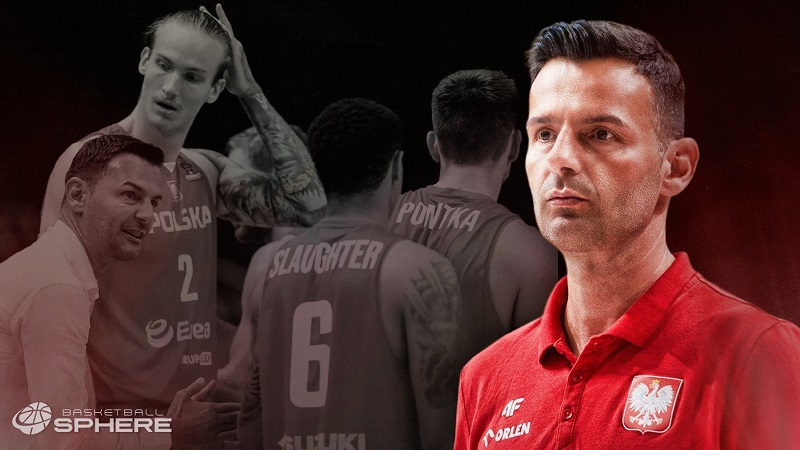Igor Milicic, head coach of Poland, spoke with Basketball Sphere about preparations for EuroBasket 2025, team leaders, the challenges of coaching Poland, and his ever-growing ambitions.
A man of clear vision and coaching authority has been leading the Polish national team for years— Igor Milicic. A former national team player himself and now a coach with serious results to his name, he led Poland to a historic EuroBasket 2022 semifinal, and this year entered the club legend of Napoli by winning the Italian Serie A title.
What are your ambitions with Poland for EuroBasket 2025, especially after your great run in 2022?
“We have a somewhat new team, and our minimum goal for this European Championship is to advance past the group stage. We’re playing at home, but in general, the most important thing is to get out of the group, and then we’ll see.”
What’s the biggest challenge when assembling the roster for this tournament—player availability, form, or something else?
“The biggest challenge is getting players to complement each other. To build a game system that suits the players who are healthy and able to answer the call.”
How realistic is it to expect Poland to surprise again and contend for medals?
“We’re hoping to deliver another good result and play well. We know we’re not favorites, but we also know that people no longer see us as a basketball minnow. We’re taken seriously now, especially since we’re hosts in the group stage.”

What do you think of your group-stage opponents—who’s the toughest rival and why?
“I think we’re in a very tough group, maybe even the toughest of all. We have favorites like France, an excellent Slovenian team led by Luka Doncic, Israel with Deni Avdija who’s having a great season in the NBA, and always tricky opponents like Belgium and Iceland. It’s a really tough group.”
Looking at your roster, who would you say is your “extension on the court”?
“First and foremost, there’s Mateusz Ponitka, who plays completely differently under me than he did at Partizan. I think this suits him better. As I said, I adapt my game to the players I have. I also brought back Kamil Laczynski, who I worked with for a long time at Anwil. He returned to the national team specifically for that reason. They are my extensions on the floor.” – Milicic added.
What’s your opinion on the naturalization of American players? It’s a hot topic in basketball circles.
“Poland lacks some of the players we’d ideally want at this level, and I think if we want to popularize basketball in Poland, we need results. To achieve results, we need the help of a naturalized player. We’ve just received papers—for the first time since I’ve been coach—for Jerrick Harding and Jordan Loyd, who should officially obtain Polish passports soon so they can play at this European Championship and the upcoming qualification windows.” -Milicic shared his thoughts
Your son Igor is also on a serious career path. What’s it like being both his father and a national team coach?
“After an excellent season at Tennessee, he unfortunately got injured during his second NBA workout with the Phoenix Suns and needed surgery. He missed 11 more workouts and couldn’t play in the Summer League, which hurt his chances. Still, the Philadelphia 76ers showed interest and signed him to an Exhibit 10 contract. He’s now rehabbing with the Tennessee staff. We’ll see if he can return in time for the EuroBasket. We’re definitely counting on him—he’s a 208 cm player who can shoot, rebound, defend—a very versatile player who would be a huge asset to our current roster.”
Considering you’ve played and coached in various countries, how much does your “Yugoslav coaching heritage” influence your work today?
“That Yugoslav style is definitely present in my coaching philosophy. I put a lot of emphasis on defense—leaning toward the European side of the game—and I adapt offense to the players I have, not necessarily what I want. So you could say my approach is a blend of coaching styles.”
Do you follow the regional scene, specifically the ABA league? Some clubs are investing more than ever, while others, especially in your home country, struggle financially.
“I follow the ABA League closely. I know investments are growing and clubs are getting stronger. Fan interest is also rising, which is great. I honestly regret that, apart from Zadar, Croatia doesn’t have a team capable of contending in every ABA League game. I hope that with some changes and stronger youth development, that situation can improve—but financial support at the highest level is also essential.”
With so many foreign players in Crvena Zvezda, Partizan, and Euroleague teams overall, do you think this will hurt national teams or young domestic talent?
“No, it definitely won’t hurt national teams. Young domestic players who emerge under such competition tend to be of extremely high quality. A bigger issue might be college basketball, where not all programs offer high-level development. Some do, and they help players grow, but that’s not always the case. We need to adapt and find new ways to develop players—one way is by giving opportunities to those who’ve gone through proper basketball schooling and made sacrifices to become professionals. Perhaps we should consider policies that push coaches to put more trust in young players.” – Igor Milicic say.
How meaningful was it to win the Italian Cup with Napoli, especially given you had a brand-new team and entered the tournament as underdogs?
“That was a great experience. We came in as huge underdogs. Napoli’s budget last season was maybe the 13th or 14th in Italy, but we were well-prepared game by game. We implemented tactical setups that opponents couldn’t quickly adapt to in a short tournament. Everything clicked. The players executed perfectly, followed the coaching staff’s vision, and—with a bit of luck and some tough shot-making—we beat Milan. In hindsight, it was a well-deserved win. With that group of players, maybe we’d beat Olimpia Milano one in ten times—and it happened when it mattered most.”
You’ve coached in Napoli and Beşiktaş—how have those experiences shaped you? They’re serious European clubs. We’ve seen how much Besiktas is investing now.
“I took over Besiktas at a really tough moment—they were 2–11 and on the brink of relegation. We managed to stay up, which was the goal. It’s a club with a big history, and since then, they’ve taken major steps forward. Their budget now is at a completely different level. Coach Dušan Alimpijević is doing an excellent job there. I moved to Napoli, where I think I opened the door to bigger clubs. Right now, I’m waiting on further developments along with my manager. I still have a contract with Napoli, but we’ll evaluate other opportunities if they arise. First and foremost, I want to reaffirm my success with the national team.”
Read more:






